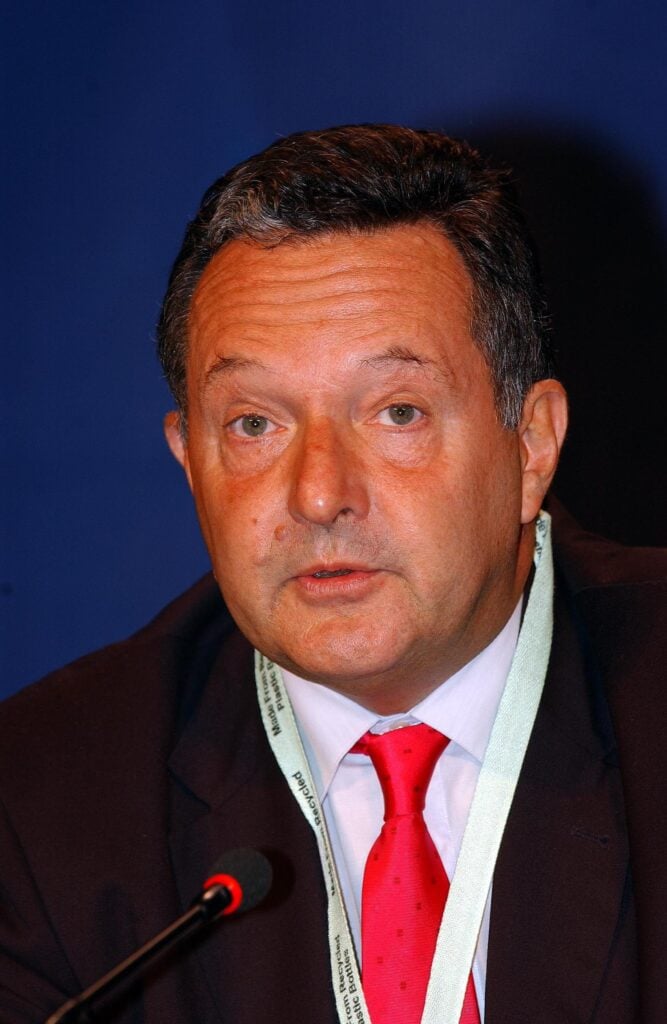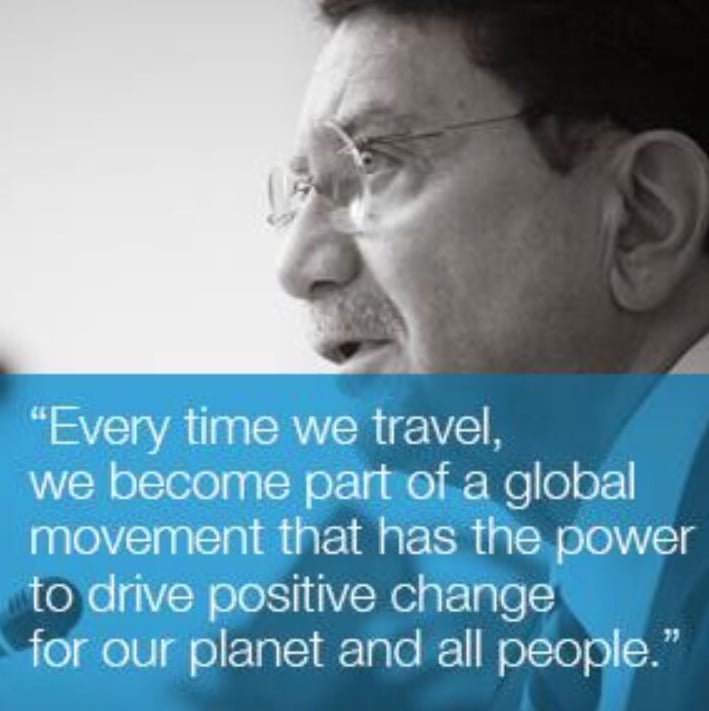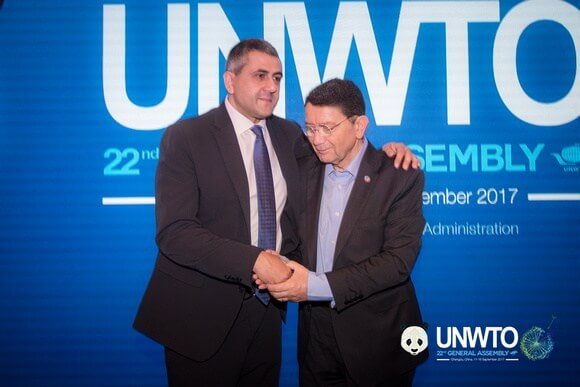Former UNWTO SG Francesco Frangialli and Taleb Rifai Explain Why
It saddens us to witness the state of our beloved UNWTO over the past eight years. The open letter by two former UNWTO Secretary Generals, Francesco Frangialli and Taleb Rifai, is a powerful message to UN-Tourism member states, tourism ministers, and members of the UN-Tourism Executive Council and a warning to maintain the integrity of the organization in critical times.
Open letter by Francesco Frangialli and Taleb Rifai:


Travel and tourism are the main activities in the world economy today. Following the World Travel and Tourism Council (WTTC) estimates, it accounts for 10 to 11 per cent of global GDP and employment. More reasonable estimates based on the methodology of the Tourism Satellite Account give 6 to 7 per cent of the total GDP, which is still a significant figure. In 2024, 1,4 billion international arrivals were registered, worldwide, resulting in 1,900 billion $ in receipts.
At the end of the sixties and during the early seventies, many countries, seeing that their tourism activity was growing, began to pay attention to the sector and felt the need to enhance cooperation among countries by establishing an intergovernmental organization. This led to the creation of the World Tourism Organization (WTO) over five years from the adoption of its Statutes in 1970 to the beginning of its activities in 1975. The two signatories of this statement had the opportunity to participate actively in the process within their own governments and later with the WTO contributing to increasing the weight of the tourism sector and the international institution that represents it.
Both of us served as Secretary Generals of the World Tourism Organization for two decades. In 2004, we transformed the institution into a specialized agency of the United Nations, renaming it UNWTO.
We are deeply concernedabout the events that have unfolded since Zurab Pololikashvili’s election in 2017. It saddens us to witness the state of our beloved UNWTO over the past eight years.
We are proud that under our two mandates, tourism has gained recognition from the international community. Ignored at the Rio Earth Summit in 1992 and absent from the UN Millennium Development Goals, tourism emerged on the international scene in 2002 with the International Year of Ecotourism and the plan of action adopted by the UN at its Johannesburg Summit.
Tourism’s role was consequently enshrined in the Sustainable Development Goals. It’s final recognition came in 2004 when the World Tourism Organization was converted into a full-fledged agency of the UN System. WTO became UNWTO. The recent appellation of “UN Tourism” does not bring anything new. It’s a farce since an amendment to its Statutes has not modified the organization’s name.
In the present statement, we shall address the issues of the legitimacy of the current leadership, the management of the Institution, and its representativeness.
We shall also call for a better World Tourism Organization.
1. Legitimacy of Mr. Pololikashvili
The current Secretary General’s initial election was clearly flawed. During the selection process by the Executive Council, Mr. Pololikashvili benefited from eliminating an African candidate from the running, which was an illegal and irresponsible maneuver. Consequently, as the other candidate from the same region was deemed unacceptable by many members, Mr. Pololikashvili was appointed by default.
The proper election by the General Assembly was conducted by applause, ignoring the individual and secret ballot required by the Statutes and requested by a member State, which should have sufficed to carry out a voting process that did not take place. Mr. Pololikashvili was not the origin of this illegal procedure but clearly benefited from it.
In his re-election bid four years later, Mr. Pololikashvili subtly manipulated the process by using the excuse of the COVID-19 pandemic, preventing a fair and open competition.
The question has now arisen whether the incumbent Secretary General is entitled to run for a third term.
This issue is complex. In 2005, the General Assembly adopted an amendment to the Statutes that limits the Secretary General’s term to two consecutive four-year mandates.
However, this limitation was meant to be provisional, pending ratification by the members. The amendment has not been ratified, and at the most recent General Assembly session, Mr. Pololikashvili was authorized to participate in the election.
Legally, he is entitled to run. However, doubts remain about the legitimacy of this move, given that a revision of the Statutes is underway. From our perspective, Mr. Pololikashvili should have honored the intentions of the Supreme Organ of our Institution. Unfortunately, he has shown a lack of respect for this principle by putting forward his candidacy.
2. Management of the Organization
The current management of the World Tourism Organization raises multiple serious concerns.
The first one relates to the successive choices of its leadership structure. Under Zurab Pololikashvili’s direction, the management team has been composed of the Secretary General and the Deputy Secretary General (DSG).
This structure was in accordance with the Staff Rules of the Institution. The post of Deputy was given to a competitor from Colombia in the 2017 election in exchange for his support to Mr Pololikashvili after the first ballot. This first phase did not last long.
The freshly nominated DSG was quickly marginalized by the new SG and his entourage and encouraged to leave his job. A new management structure, composed of the SG and three Executive Directors, was then put in place. This choice has proved to be costly, bureaucratic, and inefficient. It is not following the Staff Rules.
Since 2017, the staff has remained more or less stable, around one hundred. But an important turnover has taken place. Many experienced and capable employees were forced to leave or retire early. They were replaced by incomers recruited in a way that respected only formally the publication of a declaration of vacancy of the post but not the rest of the process.
The result was that many very qualified candidates were not aware that the post to which they were applying had already been attributed behind closed doors.
Many of the recruitments were the result of a personal choice by the Secretary General, often for political reasons and not based on the candidate’s technical qualifications and expertise.
In the meantime, the salary scale has moved upward either to recruit friends at high positions or to encourage the personal loyalty of other staff Members.
As a result, staff costs have substantially increased. Even if it is customary to maintain some flexibility in staff management, the proportion of unbudgeted staff posts -24 out of 106—is much too high. This results from the desire to recruit collaborators without respecting any rule.
His decision, taken just after his arrival, to contract an external audit firm to « clean up » the staff from those supposed to be his enemies gave an outlook on the new SG’s management style.
The auditors interrogated everyone, inspected offices and personal belongings, and listened in on telephone calls. The Director of Administration and Finance (and Chief Procurement Officer) of the Organization was sidelined on the contract with the audit company and objected to it since no tender had taken place. He was immediately fired, and the Chief of Information and Communications Technology followed suit. Both of them appealed to the Administrative Tribunal of the International Labor Organization.
They won, and UNWTO had to pay them 624,000 euros in compensation. They also suffered additional heavy expenses for the procedure, let alone reputational costs and an impact on staff morale, as a culture of opacity and arbitrary management was implemented, repeatedly reflected in the Ethics Officer’s annual reports.
These money and resources would have been better used to provide services to the Members.
The excessive weight of staff costs is one reason for the organization’s fragile financial situation. The Organization has many difficulties in balancing its budget, even formally.
The contributions paid by the Member States amount to only half of the total income, which does not reflect a sound and sustainable state of affairs.
By losing its attractiveness and the value it provides, the UNWTO is experiencing increasing difficulties in collecting the arrears contributions due by its members.
This will worsen: facing an uncertain financial situation, the Organization has been obliged to cut or scale down the activities of various programs, reducing the services provided to the Members. It’s a vicious circle. Many members ask themselves why they pay a contribution if, in exchange, they receive no benefit.
3. Relations with the Members and representativeness of the Organization
157 sovereign countries are Full Members of the World Tourism Organization. However, many important countries, especially several OECD members, are absent. F
Fifteen years ago, countries like the United Kingdom, Norway, Australia, and Canada were part of the institution. They have left, and Zurab Pololikashvili has been unable to bring them back.
Despite the announcement, he proudly made, he has also failed to lure the United States.
Unlike the other UN specialized agencies, UNWTO is not a truly global body. Its unbalanced membership is detrimental to the interests of developing countries, as the more industrialized and developed countries happen to be both financial partners and source markets of their visitors.
Weakened by the absence of some major stakeholders, UNWTO is not in a position “to pay special attention to the interests of the developing countries,” a mission assigned by its Statutes.
To express its political support to Ukraine, a country, at the time, close to his own one, Georgia, Mr Pololikashvili accused in 2022 the Russian Federation not to respect the Statutes of the Organization, forcing this important country to leave.








As a member of WTN, I would like to raise my voice against the council allowing another term for the current.SG.He is unscrupulous taking the reigns through unconventional means.
He cannot be compared to the two legendary SG’s who have set the bar very high. The next SG must meet or surpass the track record of Dr Taleb Rafai and Prof. Franco Frangialli.
I met Ms. Gloria Guevara and Mr Theoharis two both personable and qualified candidates at the Global Resilience Conference Feb. 17 in Jamaica
.
I would elect the First Female.candifate to bring real solutions and to shake up the UNWTO not only with a new name, but new mandate, new Executive Council and elegibity of new African and Caribbean member states.
-Caribnewsroom.com